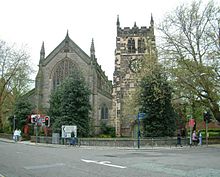St Werburgh's Church, Derby
| St Werburgh's Church, Derby | |
|---|---|

St Werburgh's Church, Derby, showing the body of the church on the left, and the conserved tower on the right
|
|
| Coordinates: 52°55′24″N 1°28′52″W / 52.9232°N 1.4812°W | |
| OS grid reference | SK 349 363 |
| Location | Derby, Derbyshire |
| Country | England |
| Denomination | Anglican |
| Website | St Werburgh's Church |
| History | |
| Dedication | Saint Werburgh |
| Architecture | |
| Functional status | Redundant |
| Heritage designation | Grade B |
| Designated | 20 June 1952 |
| Architect(s) | Sir Arthur Blomfield (rebuilding) |
| Architectural type | Church |
| Style | Gothic Survival, Gothic Revival |
| Completed | 1894 |
| Closed | 1990 |
St Werburgh's Church is a redundant Anglican church in the city of Derby, Derbyshire, England (grid reference SK349363). It is recorded in the National Heritage List for England as a designated Grade II* listed building, and is under the care of the Churches Conservation Trust.Samuel Johnson (Dr Johnson) married Elizabeth Porter (née Jervis) in the church in 1735.
It is currently preserved by Volunteers with the Churches Conservation Trust and open every Saturday from 10:30am for a few hours.
The oldest surviving part of the church is the tower which was rebuilt in 1601. The chancel was built in 1699. The remainder of the church was rebuilt in 1893–94 in stone from Coxbench quarry, the architect being Sir Arthur Blomfield. The style of this rebuilding is Gothic Revival in the manner of the 15th century. The church was declared redundant in 1990, and the body of the church, as designed by Blomfield, has been converted to commercial use. The tower and chancel have been vested in the Churches Conservation Trust. The tower was refurbished in 2004, and contains a chapel known as the "Johnson Chapel".
The tower is in Gothic Survival style. The chancel has been converted into a side chapel. It contains many of its original fittings and furniture, including an elaborate wrought iron font cover made by Robert Bakewell. The reredos contains panels inscribed with the Ten Commandments, the Lord's Prayer and the Apostle's Creed. Over the reredos is Queen Anne's Royal coat of arms. The stained glass is from the studio of Kempe, and there is a monument dated 1832 by Chantrey.
...
Wikipedia

